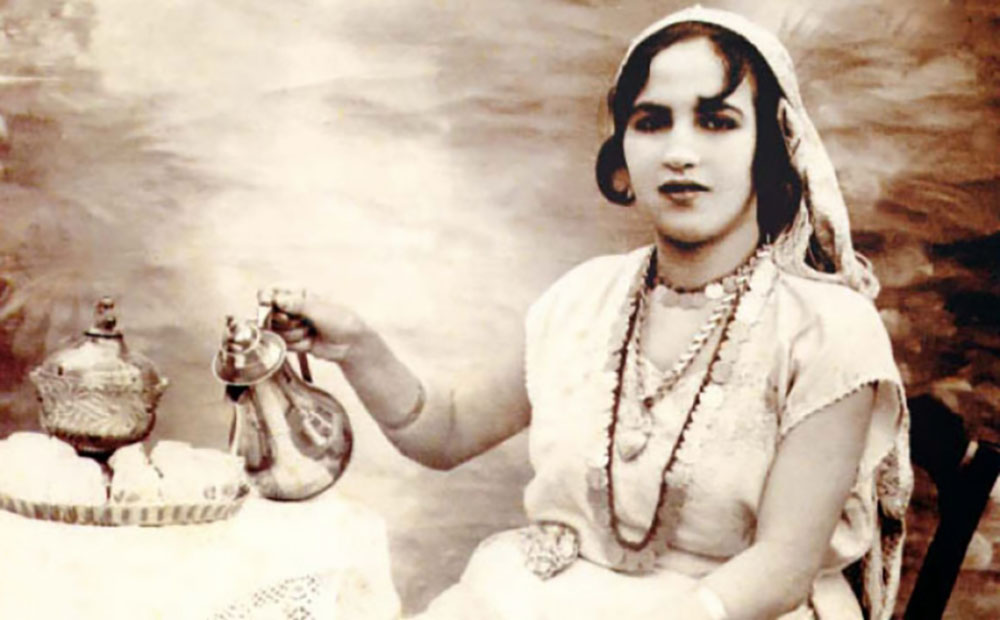
Fouad Mami
I first encountered Zoulikha bent al-Chaib as a character in Assia Djebar’s La femme sans sépulture (The Woman Without a Sepulture, 2002). There, I learned that Zoulikha bent al-Chaib or Zoulikha al-Chaib (1916-1957) was not an entirely fictional creation. Zoulikha was the nom de guerre of the forgotten heroine, Yamina Oudaï.
Djebar was inspired to write a biography of a woman with this exact name, the one who had embodied insurrectionary activism during Algeria’s War of Independence (1954-1962). Her story and struggles, like that of many other martyrs and militants, contradict the postcolonial and triumphalist narrative wherein Algerians have been thrilled to simply oust the colonial order and replace it with a nationalist one. The gist of this establishment’s explanation of decolonization amounts to replacing the colonial order no matter what; that is, a formal reinstatement of the colonial arrangement with a nationalist one, with little or no qualitative change in substance. Below, I try to explain the problem with the reinstatement of colonialism in nationalism. Those who suffered the brunt of colonial exploitation and misery did not fight to oust flags or deodorize what is inevitably an incorrigible order of things. Nor did they put their lives on the line to simply build bazaars, shopping malls, and impossibly overpriced upscale housing projects!
The character of Zoulikha, both the historical figure and fictional character, testifies how Algerians did not risk it all to merely replace Jacque Soustelle (the last governor-general in the colonial system) with Ahmed Benbella (the first president of the independent nation). Zoulikha stands, I argue here, for a mirroring principle that induces a social corrective. Her life challenges and choices do specify precisely our destiny as Algerians and Maghrébins (peoples of the Maghreb), where we value qualitative relations and living. Zoulikha lived in localities bordering on both Hadjout (ex-Marengo) west of Blida and Cherchell (ex-Césarée) west of seaside Tipaza. With a high school education in Blida during the 1930s, she was very well-educated, a rare but fortunate exception during colonial times. Zoulikha could have easily avoided troubles with the colonial authorities and led a passive but bountiful life. Her father was among the few remaining local notables of his times, with property, education, and social position that could easily lend his daughter a middle class, if not, bourgeois existence. She married thrice, but only her third union was out of love. She divorced her first two husbands, a daring procedure that illustrates her forceful character. The first husband was too old, and the second was too assimilated and openly collaborated with the French administration. She left him at a cost of never seeing her child again. Her third love and union was an inspiration for her, as it facilitated her decision to join the nationalistic cause.
In each step she takes, we read (in Djebar’s telling), her father was supportive of her decision. Plenty of unchecked details are attributed to her and can be found on Facebook. My essay does not regurgitate on that which is immediately accessible with either the novel or the photo. Instead, the essay accelerates the findings in both to construct a picture of a militant’s worldview, the one that is at odds with largely alienating and destructive choices irrespective of the perpetrator’s identity.
Djebar knew Zoulikha’s daughters in person, as Djebar painstakingly details in the early part of the book. Zoulikha’s three daughters were Djebar’s neighbors in Cherchell and, importantly, were in her age group. Moreover, the daughters were the ones who invited the author over to write their mother’s biography when Djebar came to settle for good in Algeria in 1976. The novel is part novel, part biography. And I think that Djebar published the book in 2002 in the spirit of mirroring Zoulikha’s struggles and choices against rampant development. By then, the Algerian establishment enacted a policy that Djebar, like many, found to be adrift from the socialist leanings that inhibited full-scale capitalism in the early decades since independence.
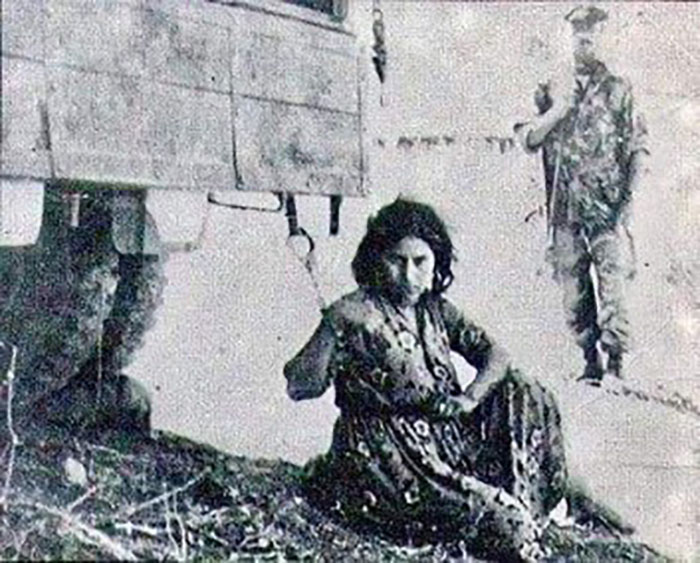
In the photo, she is calm, almost serene. Her penetrating gaze specifies that she does not shudder before what inevitably awaits her, the peeling off of her skin. Closely considered, she is joyous. Given the current predilection for joyful living no matter what, contemporary viewers looking at this photo find that joy is the last thing on Zoulikha’s mind. Fear, even terror, comes immediately to mind as the first sentiment that assumedly defines Zoulikha and her circumstances of detention, interrogation, torture, and eventually physical liquidation. The moment one registers the photo’s implication, there comes pity for the martyrdom that was her destiny. The commando in the background savors his cigarette before what is likely to be yet another torture session, perhaps her last. She is a high-profile captive. That explains why she is chained into the military truck and therefore pity reads as probably the most appropriate sensation with which to approach someone in these circumstances.
Nevertheless, pity underlines a gap in the present sensation. Zoulikha as shown through her determined look does not only solicit pity and emits no signs of regret for her insurgent deeds. The gap between our experience of her fate and her actual destiny uncovers the projection of our Hollywood-infected sense of pathos, ethos, and logos. What we presume as the lack of apparent sensation in her features underlines a distance from narcissistic existence, indicating that what we prize is anything but perverse. Nevertheless, the photo is haunting because Zoulikha contradicts all these expectations. She is finally at home: peaceful, and even serene. She embraces her ending with resilience. Indulgent and anesthetized audiences, living in the post-truth world, cannot comprehend Zoulikha’s exact state of being.
The key to registering Zoulikha’s wealth of being, her inner world as displayed in the photo, is to acknowledge beforehand that she does not share at all our own contemporary frame of reference, where the capitalistic onslaught on inner space is complete. Differently put, had she been alive now, she would not post photos of herself on Facebook, or at least, not so easily as we do. She would want to leave intimate memories a private affair, and not share them with the outside world. Why? She understands enjoyment to be inherently a growth of being, a flourishing, and a surge toward becoming oneself. We now fail (miserably perhaps) to register that the public gaze is the antipode to capturing that qualitative growth and surge. Enjoyment, not seeking a joyful existence even if the world is hitting rock bottom, incarnates her essence, precisely that which truly matters not, what superficial reality deems of value.
Contrary to positivist thinking or Zen practices, Zoulikha’s delight seizes on the insight that submission instigates depression, the opposite of enjoyment. In other words, part of authentically experiencing my inner thrill, Zoulikha reasons, is to rise against submission, to be angry, and fight the causes that upset that thrill. That is, my enjoyment is expressed fully when I stop applying makeup to the unfortunate circumstances around me, when I am actively addressing the causes of anger or unhappiness, not undertaking to terminate that which only triggers anger or misery. Again, Zoulikha’s true gratification cannot manifest without engaging her defense arsenal so that she can literally fight, less because she derives a certain pleasure from the act of fighting than simply because fighting is precisely her last resort to restore a challenged enjoyment, her balance, and the state of her authentic being in the world.
To capture the depth of the difference between enjoyment and joyful life, one needs to underline that enjoyment is not an object or even a state of mind that can be attained outside space and time, the way yoga, for instance, is said to work. Instead, enjoyment is a social relation. Zoulikha articulates herself by advancing: I want to live and I want to be happy, but not narcissistically happy. Narcissistic happiness specifies how I want to live and I want to be cheerful, irrespective of the misery around me.
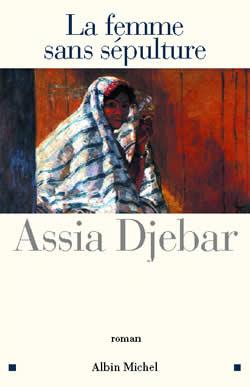
Zoulikha wanted to be happy and enjoy living by rigorously seeking to reverse the misery of the world around her. Other than an economic or geopolitical deterrent that only upsets or just disfigures her joy, the colonial situation marks a logical impossibility for reveling in her existence; that is, for accessing that threshold without which her life would be miserable and not worth living. Zoulikha joined the mountain fighters (or le maquis — note how the French equivalent has keen overtones with elderly Algerians, a sign of changing times!), because in her circumstances only the way of the mountain, or incendiary anger, promises to reconnect her with her life, the cord that keeps vibration alive, and the promise for restoring precisely one’s enjoyment. The way of the mountain for Zoulikha, and contrary to persistent but erroneous perceptions, is not an ideological choice. Zoulikha’s struggle is ontological, not ideological, a distinction that brings the discussion (here below) to more than just political power and the reign of FLN (Front de liberation nationale or the ruling party) after the demise of French colonialism.
Before broaching examples that showcase present deformities in Algeria, let me try one final time to explain what I see in the photo. Zoulikha aimed at qualitative affinities with her kids and loved ones, never just quantitative relations. The display of maternal affection, the cracking of jokes along with sincere laughter and true joy — all suggest that Zoulikha can become extremely angry. Dialectically positioned, anger in her case (and contrary to ours) has no autonomy of its own. Contemporary Algerians are notoriously defined by their irrational anger. Zoulikha’s anger, however, cannot be a timeless mark of character. In circumstances where colonialism is viewed as an injustice, an affront to the order of being and things, Zoulikha deems it too odd not to be angry. She realizes she is governed by a structure that ends in the crashing of her spirit no matter how Zen she tries to stay. Therefore, she becomes furious. Lest she allow that immanent structure set by colonialism (a gross injustice) to strangle her, she struggles to alter these untoward circumstances. She struggles less because someone tells her she has to, and more because she has extinguished all options to kill death and resist that force otherwise. Resisting death to the point of marshaling the courage to actively seek its killing underlines a vibrant life.
Djebar minutely details all those “less motherly, less womanly” possibilities before Zoulikha jumps into what we register as “outlandish” choices. We discover near the end of the novel that Zoulikha’s choices, those we tagged as being “unmotherly,” outlandish or unusual are so only in our present, that is, alienated existence. The moment we start measuring qualitative living, a threshold is crossed, and we cease finding Zoulikha’s choices odd or outlandish.
Pq With Zoulikha, one precisely finds no trace of narcissistic courage. Instead, one finds her bursting with historical courage. Her logos underlines my people’s collective resolve to jump in into history, reverse enslavement, and mount a revolution.
The novel is an exercise in reading. Its message does not thrive on representation but on emitting vibration, a radically subversive paradigm in writing. Approaches that deploy postcolonial reading to grapple with Zoulikha’s inner world do not even begin to approximate the idea behind that paradigm, let alone do justice to the character and the woman behind that character.
In a series of arresting scenes and before falling a prisoner of war to French paratroopers, their torture (including rape), and push off from a helicopter, the revolutionary Zoulikha embraces one of her daughters (Mina, diminution of Amina) while fully aware that she is no longer among the living. Readers cannot miss how Zoulikha’s mastery of detachment or what Slavoj Žižek qualifies as “the preemptive self-exclusion from the domain of the living” is rarely paired. We read how Zoulikha is mentally clear and, importantly, at peace with the fact that she is an atypical mother; she has no qualms regarding her insurrectional choices and how such choices close on her relationship with her loved ones including her toddler. For under colonial occupation she understands she cannot pretend to overlook the immanent structure effusing injustice and focus solely on the domestic. Likewise, readers cannot overlook how Zoulikha for two years had left her little children unparented while she had been in the mountains promulgating revolutionary corps.
So far, this reading has zoomed on the logos (or the collective consciousness) of the colonized population, less to celebrate the role of Zoulikha as a woman and more to underline the humanist dimension in that exceptional woman as she incarnates her people’s synthesis for emancipatory action. It is that emancipation that I find largely impaired now, sixty years after formal independence. With Zoulikha, one precisely finds no trace of narcissistic courage. Instead, one finds her bursting with historical courage. Her logos underlines my people’s collective resolve to jump in into history, reverse enslavement, and mount a revolution. It is a collective crossing from a passive threshold of consciousness to an active one, whereupon a historical subject registers his or her permanent movement toward emancipation. Acquiring the certitude of herself is the understanding that Zoulikha’s singularity finds its raison d’être only in the historical motion that celebrates her becoming one with the world, a universal subject, despite geography, language, religion, or culture. Revolution — she finds — is nothing but the individual’s return to origins, to a desalinated existence. When risking her life and actively anticipating the desalinated world, Zoulikha cannot help but experience joy. The latter crystallizes the intensity and determination for freedom including the freedom from freedom as defined by the postcolonial order.
In Algerian parlance, disgruntled people always ask what would true revolutionaries, les vrais maquisards (both living and dead) — those who fought during the war of independence against colonial troops — think today of their sacrifices when they note the brutal capitalistic policies and practices, almost deliriums, of the postcolonial order? Delirium is neither a rhetorical nor parabolic approximation.
Still wondering why Zoulikha? And why now? Zoulikha stands as the true measure that qualitatively weighs our choices. The differential between hers and ours captures whether formal independence only was worth the trouble. Why now? Because her story does not correspond to capitalistic castings as spearheaded by the FLN. Hence, the necessity to wonder what would true maquisards think of the entire framework of independence and its sick propulsion ending in bazaars, shopping malls, and residential areas exclusively developed for the filthy rich — all amidst massive poverty, youth unemployment, and savage living standards.
If there is one lesson to glean from Zoulikha’s story, it is how the postcolonial policymaker should avoid granting permissions for upscale and posh residences. With their exclusive private education catering to the nouveau rich, these residences are time bombs. Irrespective of how the local media willingly avoids covering the issue, let alone gauging its grave implications, the next social explosion will be unlike anyone experienced before.
Thus, the likelihood of Zoulikha’s telling revulsion and anger does not register if Algerians really wanted FLN rule. For precision’s sake, let me rephrase the earlier sentence. It is not like Algerians enjoyed French colonialism, nor that they sought an indefinite war of all-against-all with colonists (les pieds noirs) and metropolitan France alike. They fought — like Zoulikha — for replicating that wealth of being, aspiring for authentic joy, and not meekly reproducing consumerist and ephemeral glee. In what I think the best biography ever available about Zoulikha, Djebar cleverly underlines la déchirure or the rupture with les maquisards’ insurgent life in the mountains and the differential between the country’s propulsion for the future both then and now. Before being a denunciation of FLN misrule, corruption, or incompetence, Zoulikha’s story reminds Algerians along with the world at large of the civilizational decline, where living does not have to be synonymous with breathing. She insists that living has to be a vibration, a permanent revolution, or not at all.





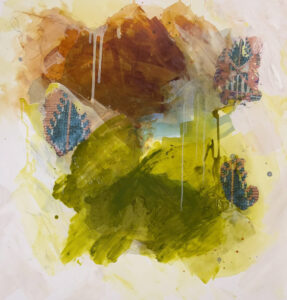


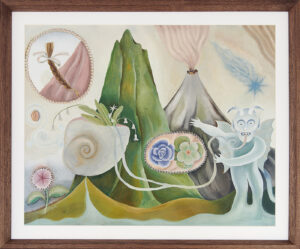

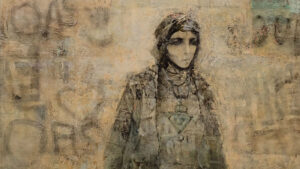

















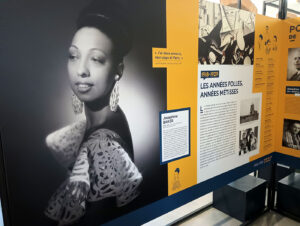

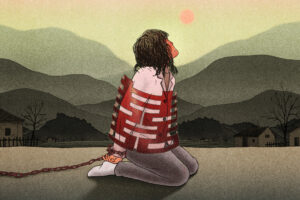

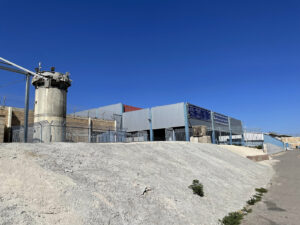
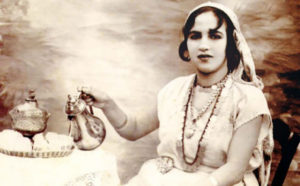





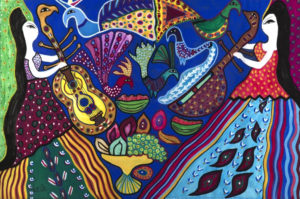




Ça fait très mal au cœur de voir une telle position (photo) pour une femme musulmane sur sa terre, puis torturée et exécutée par le colon français, et qui cherche toujours à rétablir les relations après 62 ans d’indépendance et la perte de nos grands parents morts en martyrs comme ZOULIKHA Allah Yarhamohom. Offfffffffffff